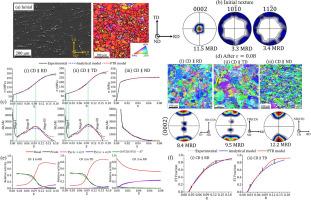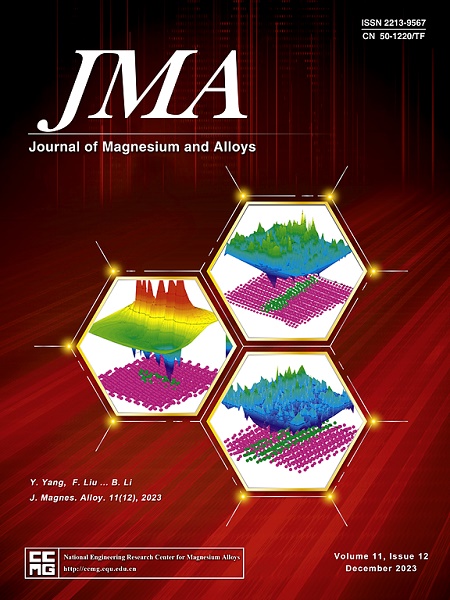热轧Mg-3Al-0.5Ce合金各向异性压缩变形行为
IF 15.8
1区 材料科学
Q1 METALLURGY & METALLURGICAL ENGINEERING
引用次数: 0
摘要
研究了热轧Mg-3Al-0.5Ce合金的各向异性压缩变形及其与组织和织构的关系。热轧合金的晶粒呈细长等轴状,沿轧制方向晶界内有长排列的Al11Ce3相,沿法向方向晶界内有基态织构。采用基于解析和基于晶体塑性的粘塑性自洽优势孪晶重定向(VPSC-PTR)方法模拟了流动曲线和织构演变,以更深入地了解变形行为。对于压缩方向(CD)∥到RD和横向方向(TD),基底纹理对CD是⊥~⊥,这有利于{101¯2}< 101¯1 >{101¯2}< 101¯1 >扩展孪晶(ET)。ETs以应变形核、加宽并吞噬母体基质,晶格沿< 21¯1¯0 > < 21¯1¯0 >轴旋转~ 86.4°~ 86.4°,以c轴→∥→→→→→→→→→→→→→→→→→→→→→→→→→→→→→→→→→→→→→→→→→→→→→→→→→→→→→然而,与之前研究的单相镁合金相比,Al11Ce3削弱了基体织构强度,降低了ii阶段应变硬化。Al11Ce3金属间化合物的存在延迟了ET成核事件,其开始于ε ~ 0.018ε ~ 0.018。ET分数演变为~ 0.85 ~ 0.85,低于之前对单相镁合金的研究。从ε = 0.03到0.06,可以观察到+ve SHR斜率的减小,表明在第ii阶段的这一部分滑动活动增加。当ε = 0.1时,由于基底< a >, pyr < c + a > -I和II在ET方向的滑动活动,观察到iii期SHR降低。由于Al11Ce3析出物形貌随延伸率的变化,沿RD和TD方向的压缩行为差异不大。从CD∥到ND,由于滑移变形,压缩流动行为呈抛物线状,SHR减小。ET没有形成,纹理变化可以忽略不计,初始和最终纹理具有基底纹理~∥toCD ~∥toCD,几何硬取向。本文章由计算机程序翻译,如有差异,请以英文原文为准。


Anisotropic compressive deformation behavior of hot-rolled Mg-3Al-0.5Ce alloy
This work investigates the anisotropic compressive deformation of hot-rolled Mg-3Al-0.5Ce alloy and correlates it with microstructure and texture. Hot-rolled alloy had elongated and equiaxed grains with long-aligned Al11Ce3 precipitates within the grain boundaries along rolling direction (RD) and basal texture along normal direction (ND). Analytical and crystal plasticity-based viscoplastic self-consistent predominant twin reorientation (VPSC-PTR) approaches were employed to simulate the flow curve and texture evolution for deeper insight into the deformation behavior. For compression direction (CD)∥to RD and transverse direction (TD), the basal texture was to CD, which favored extension twins (ET). The ETs nucleate, broaden and engulf the parent matrices with strain, rotating the lattice by about axes to a geometrically hard orientation with c-axis , leading to sigmoidal flow and increasing stage-II strain hardening rate (SHR). However, Al11Ce3 weakened the basal texture intensity, reducing the stage-II strain hardening compared to the single-phase Mg alloy investigated earlier. The presence of Al11Ce3 intermetallics delayed the ET nucleation event, which initiates at . The ET fraction evolves to , lower than in the previous works on single phase Mg alloy. A reduction in the +ve SHR slope could be observed from ε = 0.03 to 0.06, indicating increased slip activities in this portion of stage-II. Beyond ε = 0.1, decreasing stage-III SHR was observed due to basal 〈a〉, and pyr 〈c + a〉-I and II slip activities in the ET orientation. The difference in the compressive behavior along RD and TD could not be observed due to Al11Ce3 precipitate's morphology with elongation along RD. For CD∥to ND, the compressive flow behavior was parabolic with decreasing SHR due to slip-based deformation. ET didn't form, and the texture change was negligible, with initial and final textures having basal texture , the geometrically hard orientation.
求助全文
通过发布文献求助,成功后即可免费获取论文全文。
去求助
来源期刊

Journal of Magnesium and Alloys
Engineering-Mechanics of Materials
CiteScore
20.20
自引率
14.80%
发文量
52
审稿时长
59 days
期刊介绍:
The Journal of Magnesium and Alloys serves as a global platform for both theoretical and experimental studies in magnesium science and engineering. It welcomes submissions investigating various scientific and engineering factors impacting the metallurgy, processing, microstructure, properties, and applications of magnesium and alloys. The journal covers all aspects of magnesium and alloy research, including raw materials, alloy casting, extrusion and deformation, corrosion and surface treatment, joining and machining, simulation and modeling, microstructure evolution and mechanical properties, new alloy development, magnesium-based composites, bio-materials and energy materials, applications, and recycling.
 求助内容:
求助内容: 应助结果提醒方式:
应助结果提醒方式:


